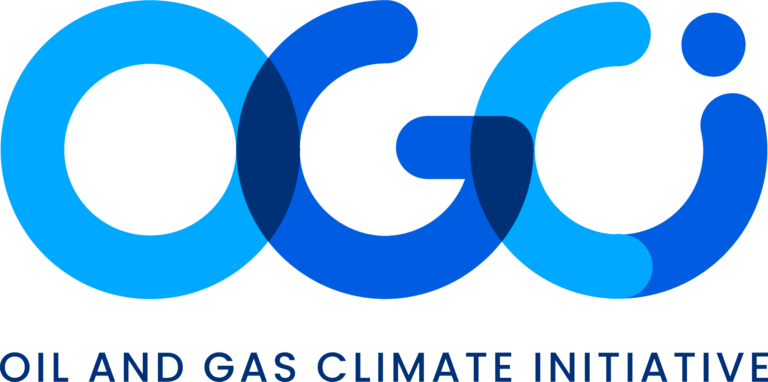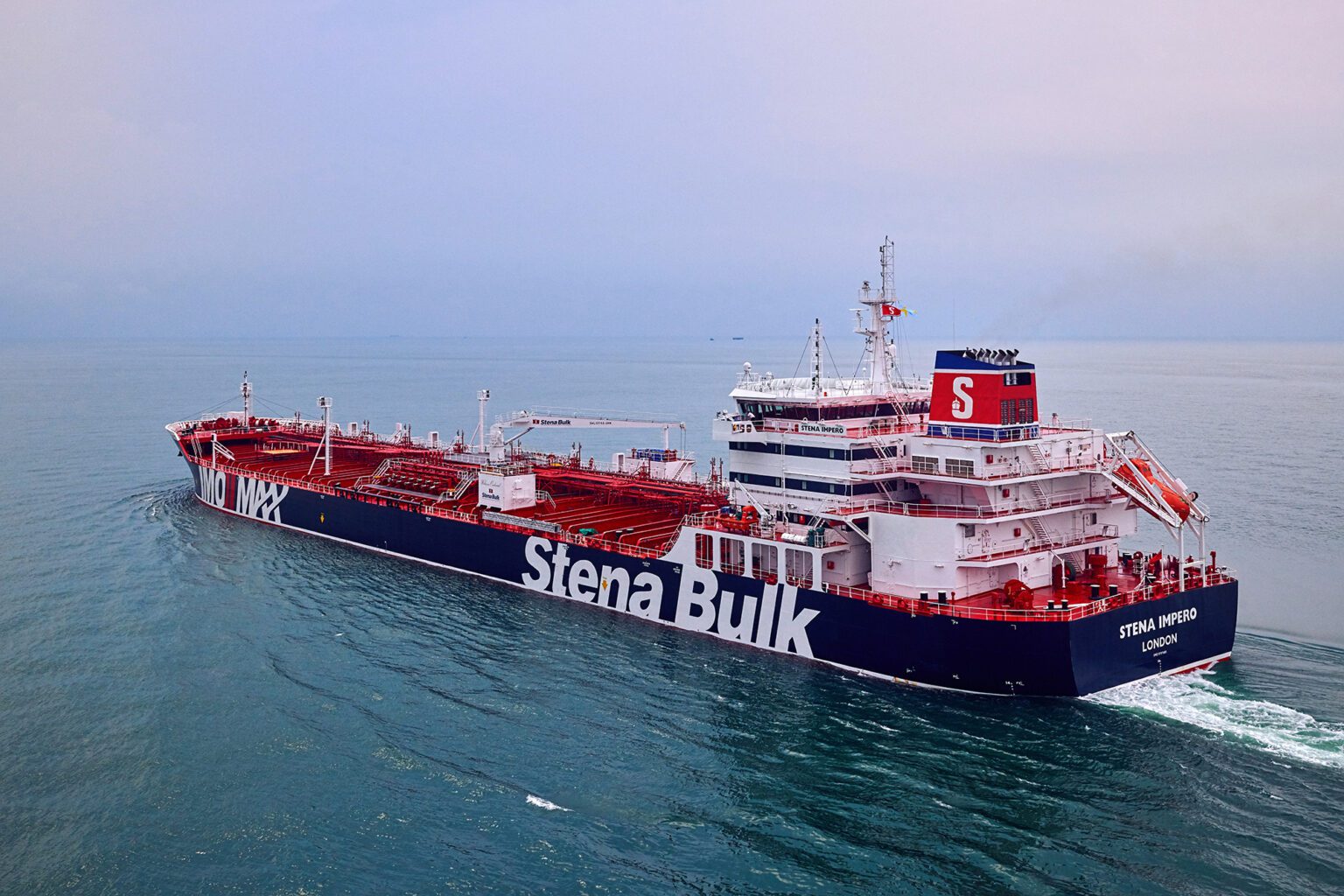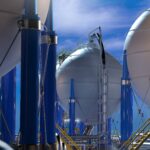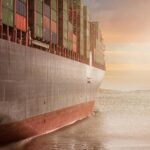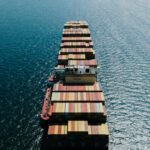London, 22 March 2023 – A consortium of global shipping organizations and the Oil and Gas Climate Initiative (OGCI) have received approval in principle from the American Bureau of Shipping (ABS), the US ship certification agency, to use a carbon capture system onboard an oil tanker.
The project’s seven-member consortium includes the Global Centre for Maritime Decarbonization (GCMD) in Singapore, OGCI, ABS, Stena Bulk, Alfa Laval, the Netherlands Organization for Applied Scientific Research (TNO) and Deltamarin Ltd., which provides ship services for marine and offshore industries.
The project aims to demonstrate the feasibility of using carbon capture onboard a vessel and is one of the largest of its kind. Approval in principle allows the consortium to consider whether the project will move to the next stage, which includes engineering, procurement, and construction.
The global shipping industry is looking at a range of solutions, including low-carbon fuels and onboard carbon capture, to help achieve a target to halve its greenhouse gas emissions by 2050 from a baseline of 2008.
The consortium’s members believe the onboard carbon capture system could help accelerate commercial deployment of shipboard carbon capture technology within the next five years.
The two-year, three-phase demonstration project is investigating onboard capture and storage and offloading captured carbon dioxide to address the operational challenges and opportunities of deploying carbon capture technology on ships.
Following a full engineering study, the carbon capture system will be built and tested prior to integration onboard a Stena Bulk medium range (MR) tanker for sea trials. A rigorous stage gate review process will be conducted prior to progression between phases.
The consortium began the first phase of Project REMARCCABLE, (Realizing Maritime Carbon Capture to demonstrate the Ability to Lower Emissions) in 2022, which involved conceptual design and a front-end engineering design study of the carbon capture system.
The second phase would include engineering, procurement, and construction of a prototype shipboard carbon capture system and onshore commissioning. Phase three would focus on integrating the carbon capture system with the MR tanker and conducting sea trials.
The GCMD plans to launch a study on offloading the liquid carbon dioxide (CO2) to resolve potential challenges and inform the third phase of the project.
Michael Traver, head of OGCI’s Transport workstream said: “The ABS’s approval in principle is a significant step forward for an important initiative to reduce emissions from shipping and demonstrates the value of collaborating across industries to develop decarbonization solutions. As we move towards deployment, OGCI will continue to provide expertise on carbon capture to help our partners show the potential of the technology to meet ambitious decarbonization goals set by the maritime industry.”
Sameer Kalra, President of the Marine Division at Alfa Laval, said: “Receiving the AIP from ABS for Project REMARCCABLE is a critical step in the further development of onboard carbon capture technology. Our support goes beyond providing technological and engineering expertise in this field; we will provide access to the Alfa Laval Test & Training Centre to test the carbon capture installation and impart training to the crew before its deployment on a vessel. Decarbonization demands the development of a wide range of emission-reducing technologies and we want to facilitate their development by collaborating with the maritime industry and helping reduce vessels’ carbon footprint.”
Professor Lynn Loo, CEO of GCMD, said: “We are excited that Project REMARCCABLE has obtained the approval in principle from ABS. This marks a significant project milestone and paves the way for the eventual shipboard installation of a scrubber and trialling it at sea. Concurrently, GCMD had issued in December 2022 an invitation for proposals (IFP) to evaluate the safety, technical and operational requirements for offloading shipboard captured CO2 during port calls. The awardee will be announced Q2 of 2023; the findings of this study will further enable the operationalisation of shipboard carbon capture sea trials.”
Erik Hånell, CEO of Stena Bulk, said: “It is fantastic be able to receive this AIP from ABS and move forward towards installing a CCUS system on one of our Medium Range tankers. Advancing carbon capture is one of the central ways that shipping will be able to meet its decarbonization goals. It is a privilege to bring our technical and shipping expertise to the table as the consortium works together to scale the technology. Installing a CCUS system on one of our vessels demonstrates our long-term commitment to technological innovation and sustainability. We intend to use the system beyond the scope of this pilot project, proving to the market what is already possible through collaboration.”
Panos Koutsourakis, ABS Vice President, Global Sustainability, said: “This is a milestone for onboard carbon capture technology, with significant potential to accelerate the pace of commercial applications. Carbon Capture will have a critical role to play in the decarbonization of shipping and we look forward to continuing our support, sharing our extensive technical guidance as we enter the prototype phase of this important project.”
Mia Elg, R&D Manager at Deltamarin, said: “Deltamarin is proud to be integrating this new technology into the pilot vessel. The AIP is an important milestone that we can celebrate with the team! We are very pleased with the great collaboration we have had during the project so far, which is essential both for ensuring good performance of the system onboard and for the entire design and retrofit process.“
Notes to Editors
- Project REMARCCABLE is the world’s first project aimed to demonstrate end-to-end shipboard carbon capture at scale.
- The project onboard a medium-range (MR) tanker owned by shipping firm Stena Bulk is targeting at least 30% absolute carbon dioxide (CO2) capture, or about 1,000 kilogrammes per hour, making it one of the largest of its kind.
- While carbon capture technologies have been successfully used by OGCI’s member companies to reduce CO2 emissions from power plants and industrial operations, their use in the shipping industry is still in development.
- Project REMARCCABLE will use non-proprietary equipment and processes, so results can be shared broadly and publicly to maximize learning and encourage further technology development. The project also aims to establish a pathway to reduce the cost of CO2 capture to 150 €/tCO2 or lower to allow the technology to be commercially deployed in future.
- The initial demonstration will involve over 500 hours of capture of the exhaust from burning high-sulphur fuel oil or very-low sulphur fuel oil and will include offloading the captured CO2 at ports along the route of a 10-day deep-sea voyage.
- Following a successful test phase, Stena Bulk will retain the carbon capture system onboard and extend its use beyond this pilot.
- With an offtaker for the captured CO2 identified, Project REMARCCABLE will cover onboard capture and storage, as well as utilization and/or sequestration to account for CO2 emissions reduction from ship to shore. This will make it the only pilot demonstrating shipboard carbon capture across the full value chain.
- The success of Project REMARCCABLE has the potential to accelerate commercial deployment of shipboard carbon capture technology within the next five years, providing MR tankers and other vessels of similar size a mid-term solution to cut GHG emissions.
Oil and Gas Climate Initiative
The Oil and Gas Climate Initiative is a CEO-led organization bringing together 12 of the largest companies worldwide to lead the oil and gas industry’s response to climate change. It aims to accelerate action towards a net zero emissions future consistent with the Paris Agreement. Together, OGCI member companies represent almost 30% of global oil and gas production.
OGCI members set up OGCI Climate Investments to create a US$1 billion-plus fund that invests in companies, technologies and projects that accelerate decarbonization within energy, industry, built environments and transportation. Combined, OGCI members have invested more than US$35 billion in low carbon solutions over the past five years.
OGCI members are Aramco, bp, Chevron, CNPC, Eni, Equinor, ExxonMobil, Occidental, Petrobras, Repsol, Shell and TotalEnergies.
The Global Centre for Maritime Decarbonisation (GCMD)
The Global Centre for Maritime Decarbonisation (GCMD) was set up on 1 August 2021 as a non-profit organisation. Our strategic partners include the Maritime and Port Authority of Singapore (MPA), BHP, BW Group, Eastern Pacific Shipping, Foundation Det Norske Veritas, Ocean Network Express, Sembcorp Marine, bp and Hapag Lloyd. Beyond the strategic partners, GCMD has brought onboard 13 impact, coalition and knowledge partners that engage at the centre level, in addition to numerous other partners that engage at the projects level.
Strategically located in Singapore, the world’s largest bunkering hub and second largest container port, GCMD aims to help the industry eliminate GHG emissions by shaping standards for future fuels, financing first-of-a-kind projects, and piloting low-carbon solutions in an end-to-end manner under real-world operations conditions.
Alfa Laval
Alfa Laval is a world leader in heat transfer, centrifugal separation and fluid handling, and is active in the areas of Energy, Marine, and Food & Water, offering its expertise, products, and service to a wide range of industries in some 100 countries. The company is committed to optimizing processes, creating responsible growth, and driving progress to support customers in achieving their business goals and sustainability targets.
Alfa Laval’s innovative technologies are dedicated to purifying, refining, and reusing materials, promoting more responsible use of natural resources. They contribute to improved energy efficiency and heat recovery, better water treatment, and reduced emissions. Thereby, Alfa Laval is not only accelerating success for its customers, but also for people and the planet. Making the world better, every day.
Alfa Laval has 20,300 employees. Annual sales in 2022 were SEK 52.1 billion (approx. EUR 4.9 billion). The company is listed on Nasdaq Stockholm. www.alfalaval.com
Stena Bulk
With offices in seven countries, Stena Bulk is one of the world’s leading tanker shipping companies. The company controls a combined fleet of around 80 vessels. Stena Bulk is part of the Stena Sphere, which has more than 20,000 employees and sales of SEK 60 billion. www.stenabulk.com
ABS
ABS, a leading global provider of classification and technical advisory services to the marine and offshore industries, is committed to setting standards for safety and excellence in design and construction. Focused on safe and practical application of advanced technologies and digital solutions, ABS works with industry and clients to develop accurate and cost-effective compliance, optimized performance and operational efficiency for marine and offshore assets.
Deltamarin
Deltamarin Group provides ship design, offshore engineering and construction support for the marine and offshore industries worldwide. The services include the full range of consulting, design and engineering as well as procurement, support for construction and installation. The Group employs around 400 experts in its own and associated companies located in Europe and Asia. Deltamarin is part of China Merchants Group, a Fortune Global 500 corporation. www.deltamarin.com
